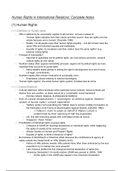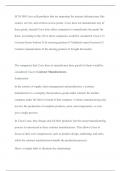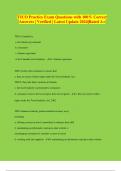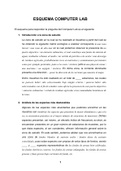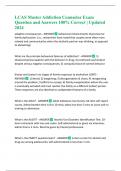(1) Human Rights
(1.1) Definition of ‘human rights’
- HRs is defined by its universality: applies to all humans, not just a subset of
- “Human rights indicates both their nature and their source: they are rights one has
simply because one is human” (Donnelly 1998)
- Reality: not all people enjoy their human rights (equally) -- but all humans have the
same HRs and hold them equally and inalienably
- Equality of rights: do murderers and their victims have the same rights? (e.g.
prisoner voting rights)
- Principle of indivisibility?
- Idea that to guarantee civil & political rights, we must ensure economic, social &
cultural rights (& vice versa)
- Northern states often oppose indivisibility principle: regard civil & political rights as more
important than economic & social rights
- Many wealthy states persist in seeing the right to development as a set of moral,
not legal, commitments
- Southern states often remain mistrustful of universality norm
- Emphasise cultural relativity & national sovereignty
- ‘Human rights regime’: the entire human rights system; includes laws & norms
(1.1.1) Cultural Relativism
- Cultural relativism: ethics develops within particular social contexts. Social contexts are
distinct from one another, so there cannot be a ‘universalist’ moral framework
- Diverse cultural, religious, & philosophical traditions
- Rise of cultural exceptionalism → ‘sovereignty’ as defense against ‘Western’
system of human rights / cultural imperialism
- Taliban: pretty much everything the Taliban does to women violates Convention on
the Elimination of All Forms of Discrimination Against Women (CEDAW, 1980)
- → Taliban’s claim to speak on behalf of Afghan culture is
undermined by their silencing of half the population
- US: fine with executing people who committed crimes as minors
- Singapore: “Asian Values”
- Prioritisation of individual rights vs group rights.
- Criticisms of UDHR for focusing excessively on individual rights, while neglecting
the rights of society & the common good
- African Charter on Human and People’s Rights
- Equality of rights: is there a hierarchy of rights?
- But binaries of North/South or West/non-West obscures the contributions & agency of
states outside the Global North re: HRs (Sikkink 2015)
- History of HRs policies reveals: HRs policies have often been embraced by the less
powerful to try to restrain the more powerful
- Latin America drafted the first intergovernmental declaration of rights (the
“American Declaration”) 8 months before UDHR was passed in UNGA, 1948
- All the rights in the UDHR also appear in the American Declaration
, - NGO & LatAm lobbying led to inclusion of HRs language in UN Charter
- The language was not the language of Great Powers; adopted by Great
Powers only in response to pressures from smaller states & civil society
- Arguments against cultural relativism:
- (1) Those advancing the exceptionalist claim do not genuinely & legitimately
represent those on whose behalf that claim is made
- Often flimsy disguise for totalitarian tendencies
- Islam & HRs scholars: much of Islamic fundamentalism do not align w/
Islamic texts / jurisprudence
- (2) Religious freedom & tolerance not traditionally Western either
- Stoning in Bible; Harvard Law School not admitting women until 1950s;
colonialism & Section 377
- (3) HRs is grounded in modern social, economic, & scientific developments
- Issue: implies countries whose HRs do not meet our standards are
‘backwards’ / ‘uncivilised’ → racist & Western-centric narrative
- Issue: does not explain why countries with similar levels of development
have vastly different conceptions & practice of HRs
(1.2) Emergence of HRs in Int’l Law
(1.2.1) Individuals as subjects of int’l law
- Changes took place in int’l law after WWII to include individuals (not just states)
- Until 1945, only states were subject to int’l law (emphasis on state sovereignty). But
Nazi Germany led to belief that states cannot necessarily be trusted
- → Consensus by end of WWII that HRs & democracy would need to be an essential
part of post-war order
- UN Charter (1945): first recognition of human rights (but very vague guidelines)
- Preamble, Art. 1, 55, and 56
- But Charter still emphasises principles of state sovereignty
- Universal Declaration of Human Rights (1948)
- Only a “statement of declaration”: not legally-binding
- First time an int’l organisation had attempted to draw a list of HRs
- Idea that people have rights in virtue of being human, not in virtue of being a citizen
of particular states
- Cold War
- 2 International Covenants + UDHR = known as “International Bill of Rights”
- Covenants are legally-binding treaties; includes enforcement mechanisms
- 2 covenants:
- International Covenant on Economic, Social and Cultural Rights (CESCR)
- International Covenant on Civil and Political Rights (CCPR)
- Different Conventions
- More specific and narrowly defined, compared to Int’l Bill of Rights
- Jus Cogens: principle in int’l law that is so fundamental that it binds all states and
does not allow any exceptions. A treaty that conflicts with an existing jus cogens
rule is void
- Fundamental idea: affects all states, including ones not directly involved.
Concerns humanity
- Convention Against Torture (1984)
- Convention on the Rights of the Child (1989) → adopted unanimously
, - Convention on the Elimination of All Forms of Discrimination Against Women
(CEDAW, 1979)
- Convention on the Rights of Persons with Disabilities (CRPD, 2006)
- HRs after the Cold War: ‘New World Order’ (Bush)
- Increased recognition that HRs matters
- Spoke of need for collective action & a strong UN; strengthen int’l law & int’l orgs
- See: actions like increased humanitarian interventions (Charter Ch VII invoked;
threats to “int’l peace and security”)
- Critique: really a ‘New World Disorder’
- Break down of states, internal wars; genocide; nationalism
- Economic interests emphasised > HRs. See: Bill Clinton not condemning
China re: Tiananmen
(1.2.2) Problems of Enforcement
- Agreement on int’l HRs laws was possible & happened. But the main problem lies in the
enforcement of these provisions
- Crux of int’l law: agency is on states, in creating, enacting, & enforcing int’l law
- HRs are rights for individuals, but obligations for states
- Signing of treaties is only a starting point (see Genocide Convention)
- National interests and sovereignty, often > human rights culture
- Tension: both are parts of int’l law
- Increase in HRs culture adding normative pressure
(2) Theoretical Foundations
- Different approaches towards the role of int’l institutions & the importance of int’l law
- Realism, liberalism & int’l society are rationalist approaches (i.e. focus on material world)
- Alternative approaches: shift away from analysing just inter-state relations; analyses
structures, intra-state relations etc.
- Emergence of norms?
- ‘Norm emergence’: some threshold / tipping point, where a critical mass / relevant
state actors adopt the norm
- ⇒ norm acceptance: states ratify int’l HRs treaties, incorporate int’l
HRs into their foreign policies & domestic law etc
- Theory: int’l norms emerge when they are embraced & espoused by the hegemon
- Issue: doesn’t explain why hegemonic states begin to pursue HR policies
- Issue: not all major HRs victories were result of hegemonic pressures, e.g.
global campaign against apartheid
- Theory: int’l norms originate in strongly held principled ideas (intrinsic quality of HRs
norms), not in state interests
- E.g. Convention against Torture was crafted by govt officials in consultation
w/ Amnesty International, after increased global awareness about torture
created by Amnesty’s Campaign Against Torture in 1973
- HRs used to define who is in / out of the club of liberal states
- Theory: not enough for individuals to develop norms; must actively promote globally
through intense campaigns
- E.g. NGOs & transnational coalitions conduct intense campaigns to
persuade states of the importance & value of new norms, like anti-apartheid,
anti-slavery, women’s suffrage etc. campaigns
, - ‘Normative entrepreneurs' use language, information, & symbolic activity to
redefine an activity as ‘wrong’
(2.1) Realism
- Theory (note: various realist theories, but these are the shared assumptions)
- Arg: HRs emerged primarily from the goals & needs of powerful states →
reflects interest of powerful states
- Statism: states = principle & only actor
- Survival: states are responsible for their own survival. States are rational actors
who seek to maximise power / security
- System of anarchy: so states rely on self-help
- Emphasis on state power, national interests, & security
- War seen as natural / inevitable
- Morality seen as secondarily
- Int’l law: believe int’l law is irrelevant; no central enforcement mechanisms
- Law in national arena only, not in int’l politics
- People only obey laws because of sanctions. But internationally, punishment is rare
- Powerful states only follow int’l law if it coincides with state interests. Weak states
will be compelled to follow int’l law by powerful states
- Powerful states create rules limiting use of force for self-interested reasons, & will
violate them if it ceases to fall in w/in their interests
- E.g. States agree to Geneva Convention to avoid having their own soldiers
tortured / civilians intentionally targeted. But US torture re: War on Terror
- HRs: realists are proponents of cultural relativism
- HRs may be viewed as a potential threat to int’l order, since state sovereignty is a
central organising principle
- More disorder if this is messed with (see humanitarian intervention)
- Challenges / criticism
- Great Powers (China, USSR, UK, US) meeting to draft UN Charter (Dumbarton
Oaks): initial draft only contained one reference to HRs. Was smaller states (e.g.
LatAm) that pushed for more inclusion of HRs language
- Cannot explain why int’l law has expanded, & why states comply, even when there
is no obvious sanctions happening
(2.2) Liberalism
- Theory
- States as main (but not only) actors. IOs, NGOs, domestic politics etc
- IOs & NGOs important in placing issues on the int’l agenda & lobbying
states & IOs
- IOs as arenas in which states interact & interests are shared
- Int’l system still anarchic, but cooperation is possible and important: states can use
this to ensure their own survival
- Assumption: collective action can help states overcome the insecurities of
anarchy
- Possible as states have some shared interests
- Int’l law: seen as important for regulating relations between states
- Believe that universal norms exist, and are enshrined in int’l law. These then
influence state behaviour

